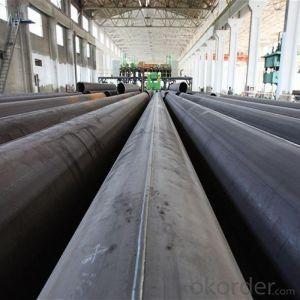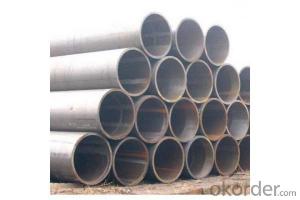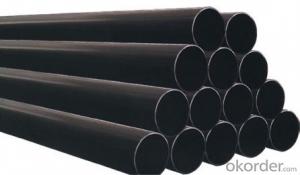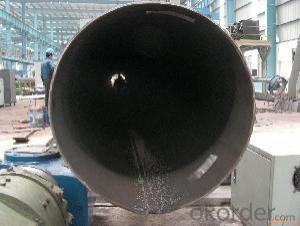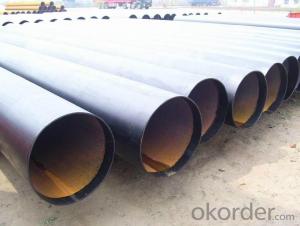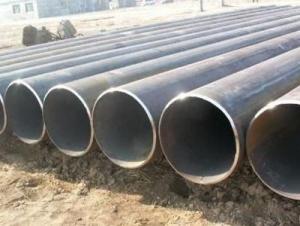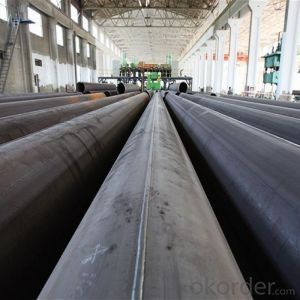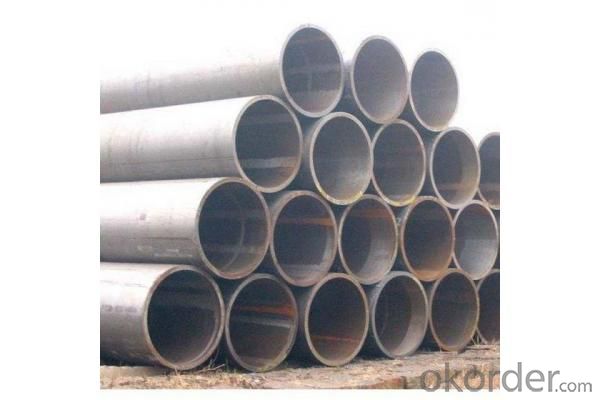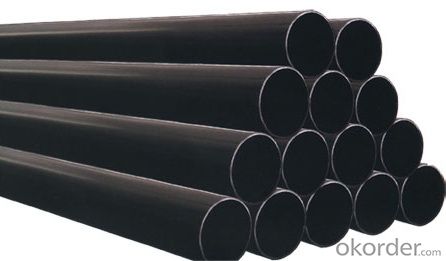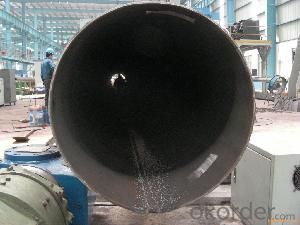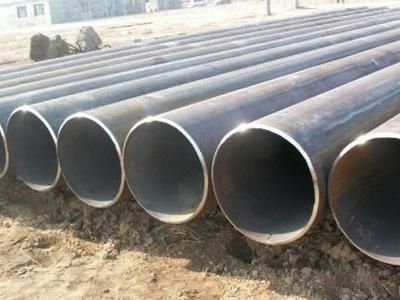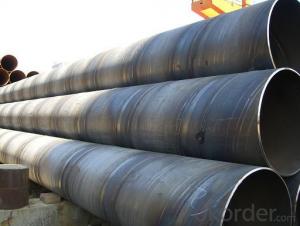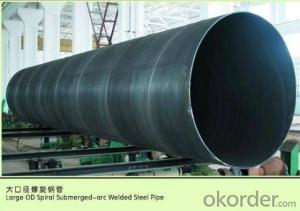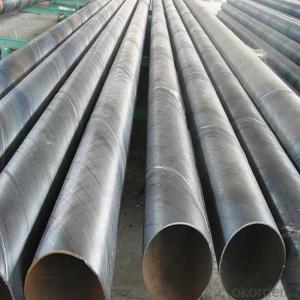API SSAW LSAW CARBON STEEL PIPE LINE OIL GAS PIPE 12''
- Loading Port:
- Tianjin
- Payment Terms:
- TT OR LC
- Min Order Qty:
- 1 m.t.
- Supply Capability:
- 3000 m.t./month
OKorder Service Pledge
OKorder Financial Service
You Might Also Like
Packaging & Delivery
Packaging Detail: | standard export packing or as customer's requirement |
Delivery Detail: | within 10 - 30 days |
Specifications
Spiral Welded Steel Pipes and Tubes
1.Material:Q195-Q235
2.Length:1-12m
3.WT:1.0-14mm
4.O.D.:20-273mm
Spiral Welded Steel Pipes and Tubes
Product Description:
1.Material : Q235,Q345,L245,L290,L360,L415,L450,L485,GrB,X42,46,X52,X56,X60,X65,X70,X80,X100
2,Standard: SY/T5037-2000,GB/T9711-2011,API Spec 5L PSL1/PSL2,ASTM A252\A53,ISO3183,DIN17172,EN10217,JIS G3457,AWWA C200,ASTM A139,ASTM A671,ASTM A672
3.Wall thickness: 3.0mm-30mm
4.Outer diameter: φ168mm-3020mm
5,Length: 5m-12m or as your requirement
6,Corrosion protection standard: DIN30670,DIN30671, AWWAC210, AWWA C203, SY/T0413-2002,SY/T0414-2002
7,Application: Oil, gas, natural gas, water pipe, thermal electricity pipe, steel structure engineering, etc
Q195-q345 Material Steel Pipe's Materials
Elements | Chemical Compsition% | Mechanical Property | ||||||
C% | Mn% | S% | P% | Si% | Yield Point (Mpa) | Tensile Strength(Mpa) | Elongation | |
Q195 | 0.06-0.12 | 0.25-0.50 | <0.050< span=""> | <0.045< span=""> | <0.030< span=""> | >195 | 315-430 | 32-33 |
Q215 | 0.09-0.15 | 0.25-0.55 | <0.05< span=""> | <0.045< span=""> | <0.030< span=""> | >215 | 335-450 | 26-31 |
Q235 | 0.12-0.20 | 0.30-0.70 | <0.045< span=""> | <0.045< span=""> | <0.030< span=""> | >235 | 375-500 | 24-26 |
Q345 | <0.20< span=""> | 1.0-1.6 | <0.040< span=""> | <0.040< span=""> | <0.55< span=""> | >345 | 470-630 | 21-22 |
Packaging & Delivery
Packaging Detail: | Normal exporting packing,in container or bulk vessel or as per clients' request |
Delivery Detail: | 2 months after confimed contract |
Specifications
Large Diameter API 5L X70 PSL2 LSAW Steel Pipe
Grade: X42, X46, X50, X52, X60, B, C
OD: 1.5"-28"
WT: SCH10-SCH160
Large Diameter API 5L X70 PSL2 LSAW Steel Pipe
Specifications:
u Standard: API 5L
u Grade: B, C, X42, X46, X50, X52, X56, X60, X65, X70, X80
u OD: 1.5"-28"
u WT: SCH10-SCH160
u Length: 5-12m
u Ends Finish: plain end, bevel end, grooved end
u Surface Treatment: bare, black varnished, oiled finish, red color, anti-corrosion, 3PE, FBE or epoxy coating
u Technique: hot rolled or cold drawn
u Application: api 5l steel pipe for conveying oil, water, gas
u Invoicing: based on theoretical weight or actual weight
u Payment Terms: L/C at sight, T/T or Western Union
u Trade Terms: FOB, CFR, CIF
u Certification: ABS manufacturing assessment, ABS design assessment, API 5CT, API 5L, DNV manufacturer certificate, ISO9001 quality management system certificate, ISO14001 environment management system certificate, GB/T28001 occupational health and safety management system certificate, A1 class manufacturing license of special equipment certificate, CCS, GL, LR, SGS, TüV, PDE
- Q: Seamless steel pipe is how to do it?
- Probably with 10, 20, 30, 35, 45 and other high-quality carbon steel, 16Mn, 5MnV and other low-alloy structural steel or 40Cr, 30CrMnSi, 45Mn2, 40MnB and other composite steel hot-rolled or cold rolled.
- Q: Can steel pipes be used in extreme weather conditions?
- Yes, steel pipes can be used in extreme weather conditions. Steel is known for its high strength and durability, making it suitable for a wide range of applications including construction, infrastructure, and transportation. Steel pipes are commonly used to transport fluids and gases in various industries, and they are designed to withstand harsh environmental conditions, including extreme temperatures, high pressures, and corrosive environments. In extreme weather conditions such as extreme heat, cold, or heavy rain, steel pipes can maintain their structural integrity and functionality. Additionally, steel pipes can be coated or insulated to provide additional protection against corrosion and to maintain desired temperatures. Overall, steel pipes are a reliable choice for use in extreme weather conditions due to their strength, durability, and resistance to various environmental factors.
- Q: Can steel pipes be used for wastewater treatment systems?
- Yes, steel pipes can be used for wastewater treatment systems. Steel pipes are commonly used in wastewater treatment systems due to their durability, corrosion resistance, and ability to handle high pressure and flow rates. Moreover, steel pipes can be easily welded, making them suitable for various configurations and applications within the wastewater treatment process.
- Q: Can steel pipes be used for conveying sewage sludge?
- Indeed, sewage sludge can be conveyed using steel pipes. Steel pipes possess several properties that render them suitable for this purpose. Firstly, their strength and durability enable them to endure the pressure and weight of sewage sludge without collapsing or fracturing. This is of utmost importance as sewage sludge can be quite heavy and may contain solids that could exert stress on the pipes. Secondly, steel pipes exhibit resistance to corrosion, which is crucial when conveying sewage sludge that frequently contains corrosive components. By utilizing corrosion-resistant steel pipes, one can ensure a prolonged lifespan and minimize the risk of leaks or damage. Moreover, steel pipes can be manufactured in various sizes and diameters, granting flexibility in the design of sewage systems to meet specific requirements. Nonetheless, it is vital to emphasize the necessity of proper maintenance and regular cleaning to prevent sludge buildup and maintain the pipes' efficiency.
- Q: How are steel pipes used in the manufacturing of marine applications?
- Steel pipes are commonly used in the manufacturing of marine applications due to their durability, strength, and resistance to corrosion. They play a crucial role in various applications such as shipbuilding, offshore platforms, and underwater pipelines. Steel pipes are used to transport fluids, gases, and oils, as well as for structural support and protection against harsh marine environments. Additionally, steel pipes are also utilized in the construction of marine heat exchangers and cooling systems.
- Q: What is the difference between steel pipes and copper pipes?
- The main difference between steel pipes and copper pipes lies in their material composition. Steel pipes are made of iron and carbon, while copper pipes are composed of copper metal. Additionally, steel pipes are generally more durable and can withstand higher pressure and temperature levels, making them suitable for industrial applications. On the other hand, copper pipes are more malleable and easily bent, making them ideal for residential plumbing systems. Moreover, copper pipes have better corrosion resistance compared to steel pipes, which may require coatings or treatments to prevent rusting.
- Q: How are steel pipes used in railway infrastructure?
- Steel pipes are used in railway infrastructure for a variety of purposes. They are primarily used for constructing and maintaining railway tracks, as they serve as the support structure for the rails. Steel pipes are also used for the fabrication of various components such as bridges, signal systems, and overhead power lines. Additionally, steel pipes are utilized in the construction of tunnels, culverts, and drainage systems to ensure proper water management along the railway lines.
- Q: How are steel pipes used in the manufacturing of wind turbines?
- The manufacturing process of wind turbines relies heavily on steel pipes, which are essential components for constructing both the tower and the foundation. The tower, a tall and sturdy structure, is typically made by welding together large steel pipes. These pipes are responsible for providing the necessary strength and stability to bear the weight of the entire wind turbine and withstand the powerful forces generated by the rotating blades. Apart from the tower, steel pipes are also crucial in building the foundation of the wind turbine. The foundation requires a solid and stable base to ensure the turbine remains upright and secure. To achieve this, deep foundation piles made of thick-walled steel pipes are commonly used. These piles are driven deep into the ground to anchor the wind turbine and prevent it from toppling over. Furthermore, steel pipes are utilized in the transportation of the electricity generated by wind turbines. Once the wind energy is converted into electrical energy, it is transmitted through an internal electrical system to the base of the tower. From there, the electricity is often transferred through underground cables to a substation, where it is distributed into the power grid. Steel pipes are employed to protect and encase these cables, ensuring insulation and safe transmission of electricity. In summary, steel pipes play a critical role in wind turbine manufacturing by providing structural support, stability, and efficient electricity transmission. The durability and strength of steel make it an ideal material for enduring the harsh environmental conditions and immense forces associated with the operation of wind turbines.
- Q: What is the difference between black steel pipe and galvanized steel pipe?
- The main difference between black steel pipe and galvanized steel pipe lies in their coating. Black steel pipe is untreated and has a dark, matte appearance, while galvanized steel pipe is coated with a layer of zinc to prevent rusting and has a silver, shiny appearance. This coating makes galvanized steel pipes more durable and suitable for outdoor use, while black steel pipes are commonly used for indoor plumbing and gas lines.
- Q: What are the different methods of joining steel pipes for oil and gas pipelines?
- There are several methods of joining steel pipes for oil and gas pipelines, including welding, threading, and flange connections. Welding involves heating the ends of the pipes and fusing them together, creating a strong and seamless joint. Threading, on the other hand, involves cutting threads on the pipe ends and using threaded fittings to connect them. Flange connections use flanges and bolts to join the pipes together, allowing for easy disassembly and maintenance. Each method has its advantages and is chosen based on factors such as pipeline design, specifications, and project requirements.
Send your message to us
API SSAW LSAW CARBON STEEL PIPE LINE OIL GAS PIPE 12''
- Loading Port:
- Tianjin
- Payment Terms:
- TT OR LC
- Min Order Qty:
- 1 m.t.
- Supply Capability:
- 3000 m.t./month
OKorder Service Pledge
OKorder Financial Service
Similar products
Hot products
Hot Searches
Related keywords
